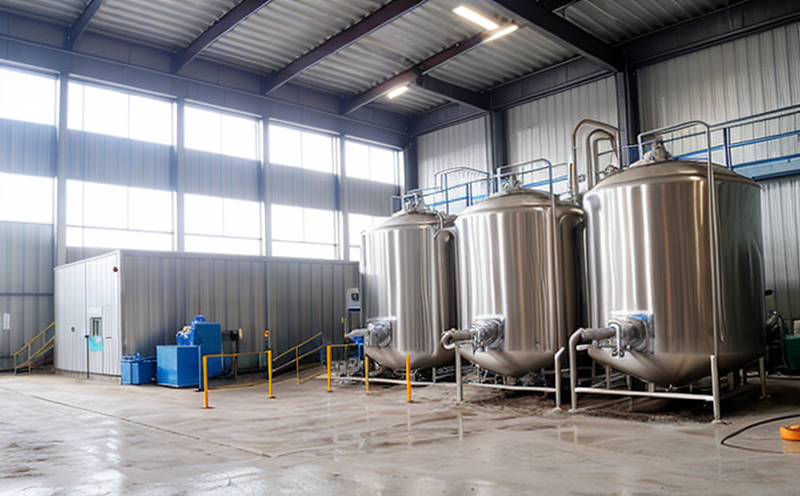ASTM D5673 Antimony Test in Process Water
The ASTM D5673 method is a critical standard used to determine the antimony content in process water. This test is essential for industries that rely on high-quality water for their processes, such as electronics manufacturing, chemical processing, and pharmaceutical production.
Antimony, while useful in various applications like soldering alloys and flame retardants, can be harmful if present in excess quantities within industrial process water. High levels of antimony can lead to corrosion issues, affect the performance of equipment, and even compromise product quality or safety. Therefore, regular monitoring through ASTM D5673 is crucial for maintaining compliance with industry standards and ensuring operational efficiency.
The test involves several steps including sample collection, preparation, digestion, and analysis using atomic absorption spectroscopy (AAS). The process begins by collecting a representative sample of the process water according to predefined guidelines. Once collected, it undergoes digestion in an acidic medium before being analyzed for antimony content.
ASTM D5673 specifies the use of AAS due to its high sensitivity and selectivity for antimony measurement. The apparatus required includes a graphite furnace atomic absorption spectrometer, which provides accurate results down to parts per billion (ppb) levels. Compliance with this standard ensures that industrial facilities can maintain water quality within acceptable limits as dictated by regulatory bodies.
Acceptance criteria stipulated in ASTM D5673 vary depending on specific application needs but generally aim at ensuring no more than 10 ppb of antimony exists in the process water. Exceeding this limit may necessitate corrective actions such as adjusting chemical dosages or sourcing alternative supply sources.
Industrial facilities that perform this test will benefit significantly by preventing costly repairs caused by corrosion, enhancing worker safety by reducing potential exposure risks associated with hazardous substances like antimony, and maintaining regulatory compliance which protects both environmental integrity and public health interests.
Eurolab Advantages
EuroLab offers unparalleled expertise in conducting ASTM D5673 tests on process water. Our team of seasoned professionals ensures accurate and reliable results every time, adhering strictly to the specified procedures outlined by ASTM standards.
- State-of-the-Art Equipment: We utilize cutting-edge instrumentation like graphite furnace atomic absorption spectrometers to achieve precise measurements down to extremely low concentrations.
- Trained Personnel: Our staff members are highly trained and certified in performing ASTM D5673 tests, ensuring consistent quality across all samples analyzed.
- Rigorous Quality Control: We maintain stringent internal quality control measures to guarantee the accuracy and precision of our results. This includes regular calibration checks and proficiency testing against recognized reference materials.
- Comprehensive Reporting: Alongside numerical values, we provide detailed reports explaining how each result relates back to industry best practices and potential implications for your facility's operations.
EuroLab prides itself on delivering exceptional service tailored specifically towards meeting the unique requirements of our clients operating within various sectors including electronics manufacturing, chemical processing, pharmaceutical production among others. By choosing us as your partner in quality assurance, you ensure compliance with industry standards while also gaining valuable insights into optimizing water treatment processes for better overall performance.
Competitive Advantage and Market Impact
- Pioneering Expertise: Being at the forefront of conducting ASTM D5673 tests, we offer unique insights that can give your company a competitive edge over others who may not have access to such specialized services.
- Industry Leadership: Our commitment to excellence in process water testing has earned us recognition as leaders within our field. This reputation attracts clients seeking reliable solutions for their most challenging problems related to antimony content control.
- Sustained Growth: By consistently providing high-quality services, we contribute positively to the growth of our industry by setting new benchmarks in terms of accuracy and reliability when it comes to measuring trace elements like antimony in industrial settings.
Through these competitive advantages, EuroLab continues to drive innovation forward, helping companies stay ahead of competitors through superior quality assurance practices. Our services not only meet current standards but also anticipate future trends, ensuring long-term success for our clients.
Use Cases and Application Examples
| Application Example | Description |
|---|---|
| Electronics Manufacturing: | In this sector, ensuring that process water contains no excessive levels of antimony is vital to prevent corrosion during soldering processes. Excess antimony could cause short circuits or other malfunctions leading to costly downtime. |
| Chemical Processing: | For chemical processing plants where certain reagents react sensitively with trace amounts of metal ions, controlling the amount of antimony in process water becomes crucial. High concentrations might interfere with reactions or precipitate unwanted by-products. |
| Pharmaceutical Production: | The pharmaceutical industry demands stringent quality control measures to ensure product purity and safety. Monitoring antimony levels helps maintain the integrity of final products, thereby protecting consumer health. |
| Water Treatment Plants: | Even in water treatment plants, maintaining low antimony levels ensures that treated waters meet regulatory requirements and are safe for distribution downstream to end users. |
These examples illustrate just some of the scenarios where accurate measurement of antimony content via ASTM D5673 is beneficial. Each application highlights why precise testing is essential for maintaining quality standards across diverse industries.





